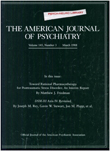Naltrexone-induced dysphoria in former opioid addicts
Abstract
Naltrexone treatment, used to prevent relapse among former opioid addicts, is reported to have an extraordinary rate of noncompliance. Since activation of opioid receptors produces a sense of well-being, naltrexone's blockade of these receptors might produce dysphoria, which could contribute to noncompliance among addicts under treatment. To test this hypothesis, the authors administered naltrexone to four men who had been free of opioids for 9 to 44 months using a 6-week, placebo- controlled crossover design. One subject dropped out with abstinence- like symptoms, and two others reported mild but significantly greater dysphoria during naltrexone administration. The results suggest that naltrexone may induce mild dysphoria long after addicts stop using opioids.
Access content
To read the fulltext, please use one of the options below to sign in or purchase access.- Personal login
- Institutional Login
- Sign in via OpenAthens
- Register for access
-
Please login/register if you wish to pair your device and check access availability.
Not a subscriber?
PsychiatryOnline subscription options offer access to the DSM-5 library, books, journals, CME, and patient resources. This all-in-one virtual library provides psychiatrists and mental health professionals with key resources for diagnosis, treatment, research, and professional development.
Need more help? PsychiatryOnline Customer Service may be reached by emailing [email protected] or by calling 800-368-5777 (in the U.S.) or 703-907-7322 (outside the U.S.).



